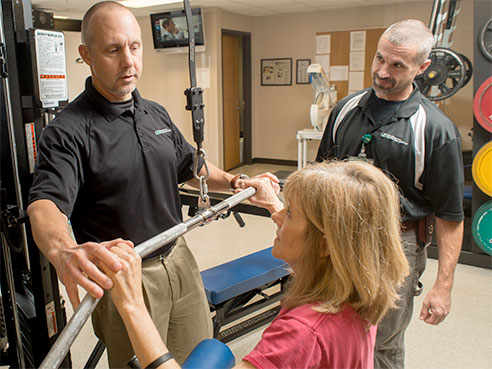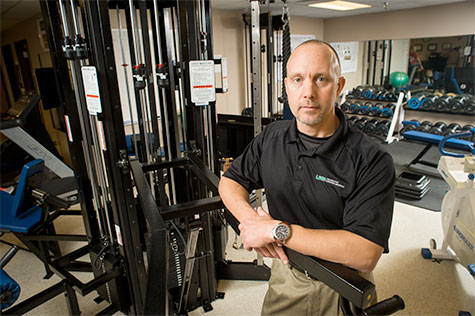 A participant in the Master's trial exercises under the supervision of Marcas Bamman and Craig Tuggle.A drug that might help older adults regrow muscle is under investigation at the University of Alabama at Birmingham. UAB is recruiting healthy adults age 65 and older for a study combining strength training exercise with the anti-diabetes drug metformin.
A participant in the Master's trial exercises under the supervision of Marcas Bamman and Craig Tuggle.A drug that might help older adults regrow muscle is under investigation at the University of Alabama at Birmingham. UAB is recruiting healthy adults age 65 and older for a study combining strength training exercise with the anti-diabetes drug metformin.
The investigators have reason to suspect that metformin might improve the effectiveness of exercise in rebuilding muscle tissue.
“Muscles atrophy as we age, and inflammation is one of the suspected causes,” said Marcas Bamman, Ph.D., director of the UAB Center for Exercise Medicine in the School of Medicine. “We have evidence from previous studies in our laboratory that metformin can play an important role in reducing inflammation in the muscles, and we are launching this study to confirm those preliminary findings.”
The key, Bamman says, are cells called macrophages, which are some of the body’s trash collectors. Macrophages surround and digest rogue cells or cellular debris that has been identified by the body as not belonging to a healthy cell. As part of this process, macrophages promote inflammation, which stimulates the immune system to respond to the threatened area.
However, when the crisis has been managed, and it is time for the immune system to ramp down, some macrophages transition from an inflammatory to an anti-inflammatory role. Through a process called polarization, M1 macrophages, which cause inflammation, transition to M2 macrophages, which decrease inflammation and encourage tissue repair.
 Marcas Bamman, Ph.D., director of the UAB Center for Exercise MedicineThe team’s preliminary studies suggest metformin may promote the polarization from M1 to M2.
Marcas Bamman, Ph.D., director of the UAB Center for Exercise MedicineThe team’s preliminary studies suggest metformin may promote the polarization from M1 to M2.
“Reducing inflammation in muscle of older adults should create a pro-growth environment and help these individuals build new muscle,” said Bamman, who is also a professor in the Department of Cell, Developmental and Integrative Biology. “We’re intrigued to see whether metformin’s effect on macrophages contributes to this regrowth. The overall goal is to establish a low-cost, personalized approach to prevent frailty in the elderly.”
The MASTERS trial is being conducted in collaboration with investigators at the University of Kentucky. The two institutions are looking for 100 adults 65 or older who do not have diabetes. Participants will exercise three times a week for 14 weeks with certified trainers and receive either metformin or a placebo. Participants will also get a physical examination, along with DEXA scans, CT imaging and other tests.
The study is funded by the National Institutes of Health. For more information, or to enroll in the study, go to Current Research at www.uab.edu/exercise.